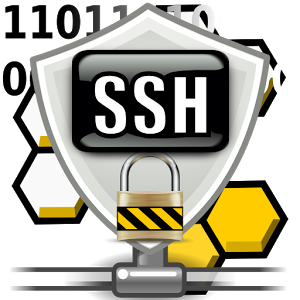
SSH (Secure Shell) is a cryptographic network protocol primarily used for secure remote access and management of systems. Its versatility and security make it essential in various scenarios. Below are the primary uses of SSH:
- Remote Command-Line Access
- Description: Connect to a remote server or device to execute commands via a secure terminal session.
- Use Case: Sysadmins and developers manage servers (e.g., Linux, Unix) for tasks like updating software, monitoring, or troubleshooting.
- Example: ssh user@server.com to log into a remote server.
- Secure File Transfer
- Description: Transfer files securely between local and remote systems or between two remote systems using tools like SCP (Secure Copy) or SFTP (SSH File Transfer Protocol).
- Use Case: Backing up files, deploying code, or sharing sensitive data.
- Example: scp file.txt user@server.com:/path/ to copy a file to a server.
- SSH Tunneling/Port Forwarding
- Description: Create secure tunnels to forward traffic through a remote server, enabling secure access to services not directly exposed to the internet.
- Use Case: Access internal network resources (e.g., databases, web servers) or bypass firewalls.
- Types:
- Local Port Forwarding: Access a remote service via a local port (e.g., ssh -L 8080:localhost:80 user@server.com).
- Remote Port Forwarding: Expose a local service to a remote server.
- Dynamic Port Forwarding: Use SSH as a SOCKS proxy for flexible routing.
- Example: Securely access a private web server via SSH tunnel.
- Remote System Administration
- Description: Manage and configure remote servers, including restarting services, editing configuration files, or managing users.
- Use Case: Maintaining cloud servers (e.g., AWS EC2, Google Cloud) or on-premises infrastructure.
- Example: Using SSH to update /etc/nginx/nginx.conf on a web server.
- Secure Automation and Scripting
- Description: Automate tasks on remote systems using SSH with key-based authentication for secure, passwordless execution.
- Use Case: Running scheduled backups, deploying applications, or executing batch jobs.
- Example: Using ssh user@server.com “bash script.sh” in a cron job.
- Accessing and Managing IoT/Embedded Devices
- Description: Connect to resource-constrained devices (e.g., Raspberry Pi, routers) for configuration or monitoring.
- Use Case: Managing smart home devices or network equipment.
- Example: SSH into a router to update firmware.
- Secure Remote Desktop and GUI Access
- Description: Use SSH with X11 forwarding or VNC/RDP over SSH tunnels to access graphical interfaces remotely.
- Use Case: Running GUI applications or managing desktops on remote machines.
- Example: ssh -X user@server.com to forward X11 for GUI apps.
- Version Control and Development
- Description: Access Git repositories or development environments over SSH for secure code pushes/pulls.
- Use Case: Developers interacting with GitHub, GitLab, or private repos using SSH keys.
- Example: git clone git@gitlab.com:user/repo.git.
- Secure Proxy and VPN Alternative
- Description: Use SSH dynamic forwarding to create a lightweight VPN-like solution for secure browsing or accessing restricted networks.
- Use Case: Bypassing geo-restrictions or securing traffic on public Wi-Fi.
- Example: ssh -D 1080 user@server.com to set up a SOCKS proxy.
- Jumphost/Proxying for Multi-Hop Access
- Description: Use an intermediary server (jumphost) to access systems in private networks or DMZs.
- Use Case: Accessing internal servers behind firewalls in enterprise environments.
- Example: ssh -J user@jump-server.com user@internal-server.com.
Why SSH is Preferred
- Security: Encrypts all traffic, protecting against eavesdropping and man-in-the-middle attacks.
- Flexibility: Works across platforms (Linux, Windows, macOS) and supports various authentication methods (passwords, keys, 2FA).
- Ubiquity: Supported by nearly all modern operating systems and devices.
The Best SSH Options in 2025
The best SSH options in 2025 depend on your specific needs, such as security, ease of use, performance, or compatibility. Below is a breakdown of the top SSH clients and servers, based on recent trends and capabilities, with a focus on widely used and well-regarded options.
Best SSH Clients
SSH clients allow you to connect to remote servers securely. Here are the top options:
- OpenSSH Client
- Platform: Linux, macOS, Windows (via WSL or PowerShell)
- Why it’s great: Open-source, widely supported, and pre-installed on most Unix-like systems. It’s highly secure, regularly updated, and supports modern cryptography (e.g., Ed25519 keys, ChaCha20-Poly1305).
- Features: Key-based authentication, SSH tunneling, SCP/SFTP, and extensive configuration options (e.g., ~/.ssh/config).
- Best for: Power users, developers, and sysadmins who want a lightweight, reliable CLI tool.
- Downside: No GUI, which may be less beginner-friendly.
- PuTTY
- Platform: Windows, Linux, macOS
- Why it’s great: A long-standing, free SSH client with a simple GUI, ideal for Windows users. Supports SSH, Telnet, and serial connections.
- Features: Key management via PuTTYgen, session saving, and basic terminal emulation.
- Best for: Windows users or those needing a lightweight GUI client.
- Downside: Interface feels dated, and it lacks some advanced features like tabbed sessions.
- Termius
- Platform: Windows, macOS, Linux, iOS, Android
- Why it’s great: A modern, cross-platform SSH client with a sleek GUI and mobile support. It’s user-friendly and supports team collaboration.
- Features: Cloud sync for hosts, SFTP, port forwarding, snippets for repetitive commands, and 2FA.
- Best for: Teams, mobile users, or those wanting a polished interface.
- Downside: Free version is limited; premium features require a subscription.
- MobaXterm
- Platform: Windows (portable version available)
- Why it’s great: Combines SSH with a suite of tools (X11 forwarding, VNC, RDP) in a tabbed interface. Great for sysadmins managing multiple sessions.
- Features: Built-in SFTP browser, X server, session management, and macro support.
- Best for: Windows users needing an all-in-one remote access tool.
- Downside: Free version has limitations; Linux/macOS support is lacking.
- ZOC Terminal
- Platform: Windows, macOS
- Why it’s great: A premium SSH client with robust terminal emulation (VT220, xterm, etc.) and scripting capabilities.
- Features: Tabbed sessions, automation via REXX scripting, and extensive protocol support (SSH, Telnet, Rlogin).
- Best for: Professionals needing advanced terminal emulation.
- Downside: Paid software, which may not suit budget-conscious users.
Best SSH Servers
SSH servers (daemons) run on the host machine to accept SSH connections. Here are the top options:
- OpenSSH Server
- Platform: Linux, macOS, Windows (via WSL or third-party ports)
- Why it’s great: The de-facto standard for SSH servers, open-source, and highly secure. It’s actively maintained with frequent security updates.
- Features: Supports modern ciphers, key-based authentication, 2FA (via PAM), and advanced configurations like ChrootDirectory for restricted shells.
- Best for: Most use cases, from personal servers to enterprise environments.
- Downside: Configuration can be complex for beginners.
- Dropbear
- Platform: Linux, embedded systems
- Why it’s great: A lightweight SSH server designed for resource-constrained environments like IoT devices or routers.
- Features: Small footprint, supports SSH and SCP, and is compatible with OpenSSH keys.
- Best for: Embedded systems or low-memory devices.
- Downside: Limited features compared to OpenSSH (e.g., no SFTP by default).
- Tectia SSH
- Platform: Linux, Windows, Unix
- Why it’s great: A commercial SSH server with enterprise-grade features and support. Focuses on compliance and high-security environments.
- Features: FIPS 140-2 compliant cryptography, advanced auditing, and cross-platform support.
- Best for: Enterprises with strict regulatory requirements.
- Downside: Expensive and overkill for small setups.
Emerging Trends and Tools (2025)
- Rust-based SSH tools: Projects like russh (Rust SSH library) are gaining traction for their performance and memory safety, though they’re not yet mainstream.
- GUI SSH Managers: Tools like Royal TS and SecureCRT remain popular in enterprise settings for managing multiple SSH connections with advanced features like credential management.
- Cloud-integrated SSH: Services like AWS Systems Manager Session Manager and Google Cloud’s Identity-Aware Proxy are increasingly used for SSH access in cloud environments, reducing the need for traditional SSH servers.
Recommendations by Use Case
- Beginners: Termius (GUI, mobile support) or PuTTY (simple setup).
- Developers/Sysadmins: OpenSSH (CLI power) or MobaXterm (versatile).
- Enterprises: Tectia SSH or OpenSSH with 2FA and hardened configurations.
- Embedded/IoT: Dropbear for lightweight needs.
- Mobile Users: Termius for cross-device sync.
Security Best Practices (2025)
Regardless of the tool, ensure:
- Use key-based authentication (Ed25519 or RSA 4096-bit) instead of passwords.
- Disable root login and use PermitRootLogin no in sshd_config.
- Enable 2FA (e.g., Google Authenticator with OpenSSH).
- Keep software updated to patch vulnerabilities (e.g., OpenSSH 9.8+ for 2025).
- Use modern ciphers and disable deprecated ones (e.g., SHA-1, MD5).

BROUGHT TO YOU BY PROLIMEHOST
We’ve been in the web hosting industry for over a decade, helping hundreds of clients succeed in what they do best and that’s running their business. We specialize in Virtual Private Servers (VPS) and dedicated servers, with data centers in Los Angeles, Denver & Singapore.
VPS SERVICES: LIGHTNING FAST SSD VIRTUAL SERVERS
Our Virtual Private Servers all feature high performance Xeon processors and SSD storage in a RAID10 configuration to optimize your server’s performance, which dramatically enhances visitor experiences on your site.
That speed is backed by unparalleled 24/7 support, featuring both outstanding response AND resolution times to maximize your uptime.
Now is the time to join the ProlimeHost virtual private server revolution.
DEDICATED SERVERS: BACKED BY A 99.9% SLA NETWORK UPTIME GUARANTEE
We only use enterprise-class hardware in our dedicated servers and offer a four (4) hour hardware replacement. Throw in IPMI for remote management, support for public and private networks, free operating system (OS) re-installs, and SATA, SAS & SSD (including NVMe) storage. Call 1-877-477-9454 or contact us. For everything from gaming, AMD and GPU servers to cheap dedicated servers, we’re here to help.
ASIA OPTIMIZED NETWORK: IMPROVING CONNECTION SPEED AND QUALITY
Procuring an Asia optimized server improves the connection speed and quality between the server and the users in Asia or China. This can reduce latency, packet loss, jitter, and bandwidth issues that can affect the performance and reliability of the server and the applications hosted on it. For more information, please call 1-877-477-9454 or contact us.


